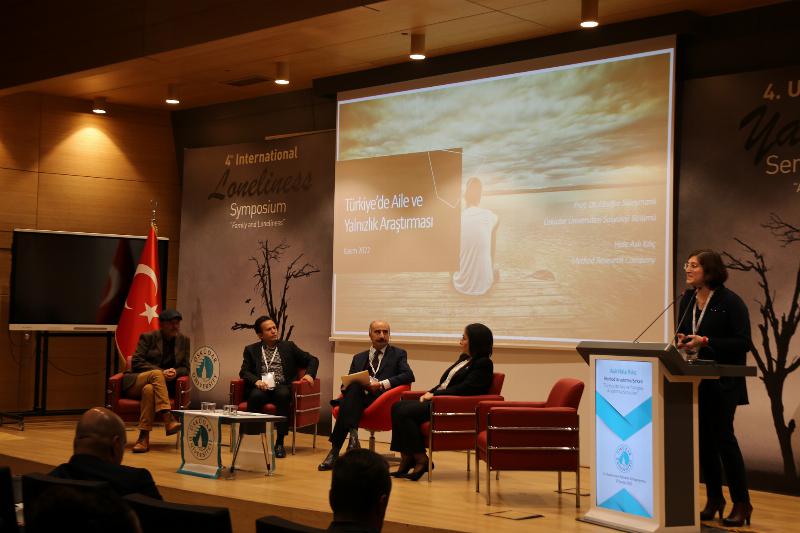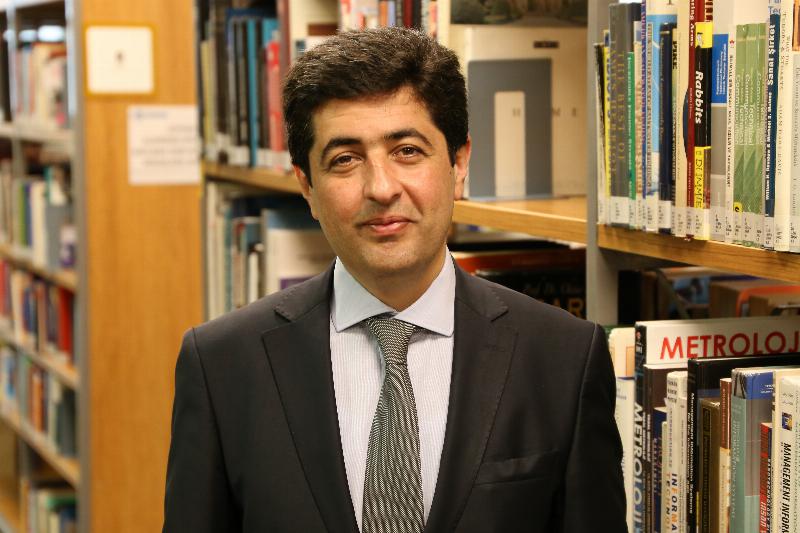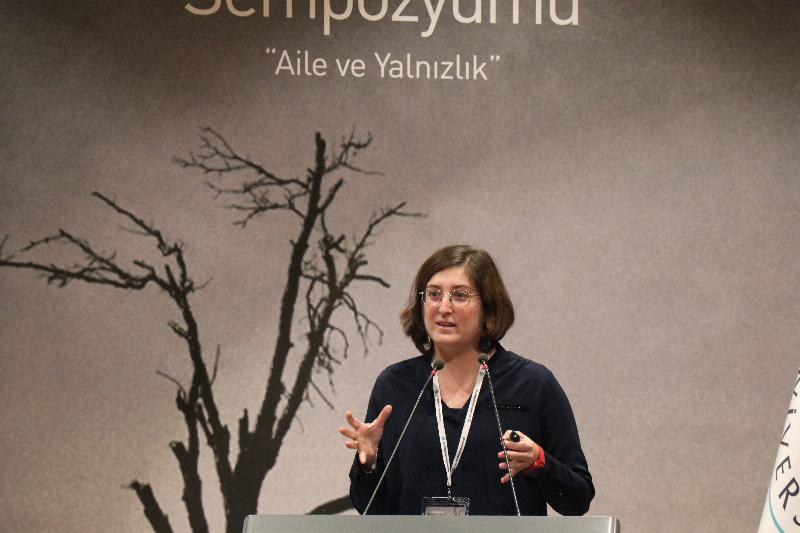Women and young people feel more lonely
As part of the 4th International Loneliness Symposium by Üsküdar University, the Research on Family and Loneliness in Türkiye, held under the coordinatorship of Prof. Ebulfez Süleymanlı, stands out with its interesting results. According to the results of the study, the feeling of loneliness increased in both men and women. 40 percent of women and 26 percent of men stated that they often feel lonely. At this point, it was noteworthy that women felt lonely twice as much as in 2019. The feeling of loneliness felt by women, which was 20 percent in 2019, reached 40 percent in 2022. In the study, it was observed that the feeling of loneliness decreased as the age increased. 40 percent of young people between the ages of 18-24 and 26 percent of those over the age of 55 stated that they often feel lonely. When the feeling of loneliness was examined on the basis of geographical regions, it was seen that 40 percent of those residing in Southeast Anatolia often felt lonely. Commenting on the results of the research, experts stated that the weakening of secure social ties within the family causes the occurrence of loneliness experiences.
The feeling of loneliness in women has increased 2 times!
40% of teens feel "often lonely"
The region that feels the loneliest is Southeast Anatolia!
The results of the Research on Family and Loneliness in Türkiye, which was held prior to the 4th International Loneliness Symposium, organized by Üsküdar University with the theme of "Family and Loneliness", were announced. The results of the research were shared with the public by Method Research Company Marketing Director Hale Aslı Kılıç on the first day of the symposium.
Under the leadership of Üsküdar University Sociology Department Lecturer Prof. Ebulfez Süleymanlı and Method Research Company Marketing Director Hale Aslı Kılıç, a comprehensive research was carried out throughout Türkiye. In the study, in which the effect of loneliness on the family was tried to be determined, people's perception of loneliness, how lonely they felt, the effects of feeling lonely on the person and the activities when they felt lonely were examined in detail.
6 thousand 100 people from 81 provinces participated in the research
A total of 6,100 people between the ages of 18-70 in 81 provinces of Türkiye participated in the research conducted through an online survey in November 2022. Throughout the research, data was obtained with a 95 percent confidence level and a 1.25% margin of error. In order for the data to reflect the whole of Türkiye geographical and demographic weighting was done.
The participants in the research are 38 percent from Marmara, 14 percent from Central Anatolia, 12 percent from the Aegean, 12 percent from the Mediterranean, 9 percent from the Eastern Anatolia region, and 8 percent from the Southeastern Anatolia region and 7 percent from the Black Sea region, looking at the geographical region, gender and age-based distribution of the research data.
Women consist the 52 percent of the participants, and men consist the 48 percent. The age range of the respondents was 18 percent between the ages of 18-24, 29 percent between the ages of 25-34, 28 percent between the ages of 35-44, 19 percent between the ages of 45-54 and 6 percent over the age of 55.
Feeling of loneliness increased compared to previous years
While 34 percent of the participants stated that they felt lonely often (often + all the time), 30 percent said they felt lonely occasionally, and 36 percent said they did not feel alone (rarely + never). Comparing these results with studies conducted in 2019 and 2021, it was seen that the feeling of loneliness increased significantly.
Women and young people feel more lonely
An increase in loneliness was noted in both men and women. According to the research, 40 percent of women and 26 percent of men stated that they often feel lonely. At this point, it was noteworthy that women felt lonely twice as much as in 2019. It was observed that the feeling of loneliness in women, which was 20 percent in 2019, reached 40 percent in 2022.
Young people feel more lonely
When these results are analyzed on the basis of age group, it is seen that the feeling of loneliness decreases as the age increases. 40 percent of young people between the ages of 18-24 and 26 percent of those over the age of 55 stated that they often feel lonely. When the change in the feeling of loneliness on the basis of age groups compared to 2021 was examined, it was seen that there was an increase in the feeling of loneliness in all groups over 25 years old compared to 2021.
We get married to relieve loneliness, but…
When the perception of loneliness was analyzed according to marital status and family structure, it was seen that 38 percent of people living alone often felt lonely. The feeling of loneliness of those who shared the same house with their friends to eliminate this feeling of loneliness decreased to 34 percent. In married individuals, this incidence decreased to 24 percent. However, when the family is involved, as the responsibilities and problems increase, the spouses move away from each other and it was determined that 33 percent returned.
It was noted that when disagreements became inextricable, the feeling of loneliness, children after separation and a life with their children, remained in the same situation as it was with his wife and, that is, at a rate of 33 percent. The fact that the presence and absence of a spouse in families with children causes almost the same feeling of loneliness was evaluated as a negative finding.
According to the results, it was observed that with the separation of the children from the family, the level of loneliness returned to the situation in which they lived alone when they were single, that is, 38 percent.
Geographically the loneliest region: Southeast Anatolia
When the feeling of loneliness was examined on the basis of geographical regions, it was seen that 40 percent of those residing in Southeast Anatolia often felt lonely. This region was followed by the Central Anatolia and Black Sea Regions with 39 percent. Marmara Region with 29 percent and Eastern Anatolia Region with 30 percent were determined as the regions with the lowest sense of loneliness.
As the income level increased, the feeling of loneliness decreased.
In the study, it was found that income level is one of the important criteria impacting the feeling of loneliness in terms of socializing and communicating. It was observed that 44 percent of the middle class and poor group and 30 percent of the rich and upper middle-class group often felt lonely. According to the research, in which there is a significant difference, it was observed that when the wealthy were alone, they met with their friends in restaurants, cafes, shopping malls and tried to relieve their loneliness by sharing, while the middle class and poor group spent time at home and stayed alone.
Loneliness connoted opposite meanings
In the study, the participants were asked to express in three words what loneliness connoted them. The most prominent word among these words was “Peace” by 10 percent. The concept of "Peace", which had a positive meaning, was followed by negative concepts such as "Unhappiness" (5 percent) and "Sadness" (5 percent). In total, 72 percent of the participants defined loneliness as a negative emotion, while a lower level of 28 percent of the participants defined it as a positive emotion.
How did the pandemic affect loneliness?
To the question “Was there a change in the situation of feeling lonely during the pandemic period?”, 24 percent of the participants stated that they felt lonelier at that time, while 15 percent stated that the feeling of loneliness decreased during the pandemic process.
While the loneliness of the young people who stayed in the dormitory before the pandemic went back to their home, it was seen that the young people who longed for their friends felt lonelier. Especially the highly educated and single people who interact with their friends outside in normal times began to feel lonelier in the pandemic. Men, people over 55, retirees, professionals, widowed/divorced people stated that there was no change in their feelings of loneliness with the pandemic more than other groups.
When we are alone, we spend time at home
While a significant portion of the participants, that is, 70 percent, spend time at home intensely when they are alone; 56 percent of respondents spend time on the Internet. 37 percent of the participants stated that they slept, 36 percent of them devoted themselves to cleaning and meal preparation, and 30 percent of them read a book.
In the research, it was seen that those who go out to the shopping mall/bazaar-market or walk with their friends, visit NGOs/associations, go to watch the match/stadium, visit the people they love, and host guests in order to feel less lonely, have a lower level of statistical loneliness.
We need someone to have a heart-to-heart talk
23 percent of the interviewees stated that they could not find someone to talk to frequently. 61 percent of the participants said that they had problems with their friends, 33 percent with their siblings, and 29 percent with their spouses. The importance of friendship and having a sibling was also seen here. The results of the research revealed that half of the married couples had a problem with a friend and half of them had a problem with their spouse. Thus, the necessity for spouses to understand each other and to be each other's confidants and friends in marriage emerge because 68 percent of people who could not find someone to talk to stated that they often felt lonely. In addition, 21 percent of the people said that they had a problem with their mother, 6 percent with their father, and 13 percent with their children. The results revealed that communication within the family should also be improved.
We are alone in crowds
Participants were also asked how often they were alone. 38 percent of the individuals stated that they were never alone (never+rarely), 23 percent said they were sometimes alone, and 40 percent said they were often alone (often+always). Even among the participants, who stated that they were never alone and that there were always people around them, 13 percent said they often felt lonely, while 28 percent said they felt lonely occasionally. The results showed that even though we were surrounded by people, there was a feeling of loneliness.
Loneliness brings unhappiness
In the research carried out in 2019, it is seen that those who feel alone feel unhappy 2.5 times more than those who do not; In 2022, this rate has increased to 3.5 times. While 70 percent of those who do not feel alone state that they are happy with their life, only 19 percent of those who frequently feel alone are happy. Whereas, 43 percent of those who feel unhappy when they are alone stated that they are happy with their life, while 57 percent of those who feel happy when they are alone stated that they are happy with their lives.
The desire to socialize in the virtual environment makes people more lonely
Üsküdar University Sociology Department Lecturer Prof. Dr. Ebulfez Süleymanlı and Method Research Company Marketing Director Hale Aslı Kılıç stated that when the research results are evaluated in general, the concept of loneliness in family life is an important phenomenon today and said:
“The lifestyle brought about by urbanization, the confinement of modern life to individual borders, digitalization, the decrease in sharing and solidarity cause the weakening of secure social bonds within the family and the occurrence of loneliness over time. The fact that individuals are distant from each other in the family, and the decrease in friends and relatives with the pandemic has also strengthened the feeling of loneliness. Socialization tools outside the family are insufficient to meet the emotional needs of the individual such as love, trust, commitment and belonging, and the individual's feeling of loneliness increases. Even individuals who are under the same roof with a family feel more alone when they cannot establish strong and secure social bonds with other family members. In addition, in order to find a solution to this situation, the individual who tries to eliminate loneliness in the new sociability created by social networks by locking on smart phones can become even more lonely. The effect of the family on the individual is important not in terms of the excess number of members, however, in terms of the intensity of the relations between the members, and the weakening relations in the family group impact the individual. The healthy rate of communication within the family, the intensity of the feeling of trust in the family environment, the person's ability to hold on to life and overcome the feeling of loneliness. In this context, strengthening the sense of trust and relationships within the family emerges as an important requirement.”
Click here for the results (In Turkish)
Üsküdar News Agency (ÜNA)


